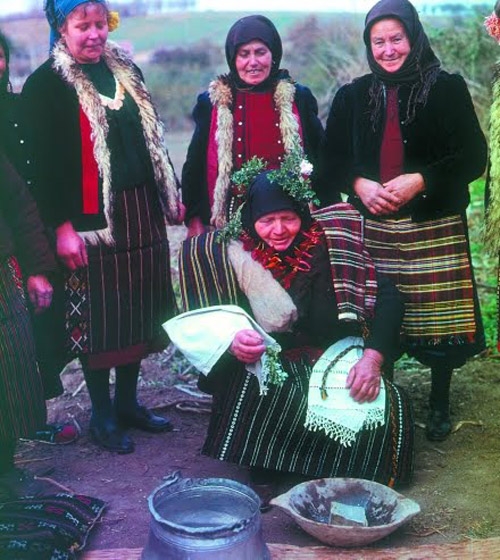Midwives' Day - Babinden

The best thing in the life of Bulgarians is the birth of their children, to raise them healthy, smart and beautiful, to direct their way to the good and happiness, to protect them from suffering and misfortune. With the fear of evil that lurks around the corner, but also with a lot of fantasy and inspiration they derived the hidden meaning from everything that could help them. Children are the meaning of marriage, of the care and life. In many rites the most important goal of the magical ritual is the birth of healthy and beautiful children and to the house to be full.
There are many beliefs about what should be done and what not in order to bear a healthy child and have an easy delivery. The most revered person by the childbirth is the midwife. When the time comes she is called secretly as the delivery is also kept secret. Yet the day, on which women, who gave birth or not, honour the midwife, is not a secret at all. On 08/21.01 we kiss the hand of the woman, who helped our offspring to see the daylight for a first time. In the olden days the woman who had aided the delivery of a child, was an old lady, a granny (bg: baba). Hence the name of this Bulgarian holiday Babinden.
Midwives' Day is the last holiday ritual which is connected with the belief in the reproducing power of water. And the water as people believe is base of the world. Water runs quickly, washes away everything bad and is a source of life and fertility.
The central figures in this ritual are the elder midwives and the women, who have recently given birth or are about to give birth soon. Three festive components can be distinguished. The first is related to bathing the infants by the midwives. This is a very old custom which over the years has been replaced with only pouring water over the granny-midwife. Early in the morning at dawn, a woman who gave birth through the year or is about to give birth soon, goes to wash the granny-midwife. Postpartum women wash her to clean the impurities from birth and those who are about to give birth pour the water to be granted a slight delivery. The whole ritual of washing is accompanied with blessings on both sides. The water from ritual washing is discarded under a rose bush to grow healthy and rosy children. After that the brides return home, prepare traditional pastry (bg: banitsa), knead bread and boil chicken. At noon, dressed in new clothes, they take the dishes, some brandy (bg: rakia) and wine and go to the granny's house. There, a bagpiper plays during the whole ritual. The following feast is accompanied by continues singing and jokes. All ritual actions have stimulating significance, more healthy children to be born and the deliveries to be easy. After lunch, the whole group head to the square, there they dance together horo, on which are allowed to participate only women but no maidens.
Part of the custom's celebration is the ritual bathing of the granny-midwife at the river or washbasin. She is adorned it with strings of dried red chillies, popcorn and more. The women take her to the water and bathe her. They believe in the power of water. Moreover, the Midwives' Day is celebrated after Epiphany, when the holy cross has purified the water.
On this day we shell bow our heads and thank our midwives! May our children be healthy and more to be born! Happy Midwives' Day!






